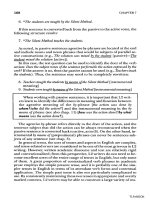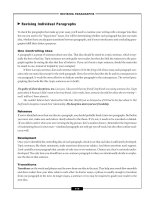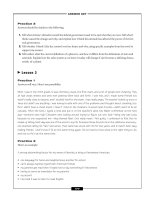Another word a day part 19 ppt
Bạn đang xem bản rút gọn của tài liệu. Xem và tải ngay bản đầy đủ của tài liệu tại đây (101.42 KB, 10 trang )
verb intr. To shirk duty.
verb tr. To cheat or swindle.
Sense 1 comes from the con artists’ old trick of selling a gold-pol-
ished piece of less valuable metal as solid gold. Sense 2 was origi-
nally military slang for an officer appointed from civilian life.
●
“Governor Yevgeny Nazdratenko was rushed to the hospital after
suffering a heart attack,and we all felt guilty to learn that we were
at fault. . . . Still,it is lucky that the heart attack was real, because
the medical establishment takes a dim view of goldbricks.”
—The Moscow Times
silver bullet (SIL-vuhr BOOL-it)
noun A quick solution to a thorny problem.
From the belief that werewolves could be killed when shot with
silver bullets.
● “The Florida Republican warned recently that a new identity
card suggested by Canadian Immigration Minister Denis
Coderre is unlikely to resolve a thorny issue about how tightly
Canadians will be screened at the border. ‘A national identity
card is not a silver bullet,’ [Porter] Goss said.”
—To r onto Star
166 ANOTHER WORD A DAY
In solitude, when we are least alone.
—
LORD BYRON, poet (1788–1824)
Metalwork
During the 1980s, I came across a vivid example of metal
words used as metaphors back in Sheffield in the United
Kingdom. I asked a local trade union leader about progress in
his recent negotiations with management over working con-
ditions. “No progress,” he said. “They want us to concede
everything—the golden handshake, the silver lining, and the
copper bottom!”
—Steve Topham, Johannesburg, South Africa
cmp04.qxd 7/21/05 12:27 PM Page 166
brassy (BRAS-ee)
adjective 1. Made of or resembling brass. 2. Resembling the sound of
brass instruments. 3. Brazen; bold; impudent. 4. Showy; pretentious.
From brass, from Middle English bras,from Old English bræs.
● “There was a shot of a muscular, tanned young man playing
paddle-ball at the beach. A blaring radio commercial would be
heard in the background while one of the sisters was preparing
lunch in her apartment. With only a couple of strokes, this
depiction of brassy, confident Israel, always in a hurry to live,
made the sisters’ lives—slow and sad, with death behind them
and death in front of them—that much more vivid.”
—Jerusalem Post
METALLIC WORDS USED AS METAPHORS 167
The innocent and the beautiful have no enemy but time.
—
WILLIAM BUTLER YEATS, author and Nobel laureate (1865–1939)
The Lone Ranger
Silver bullet resonates with us Baby Boomers (and our par-
ents) from The Lone Ranger, the longest running children’s
show on radio (1933–1954) and then on television during
the fifties and sixties. At the end of each episode, having saved
the day, The Lone Ranger rode off into the sunset without
pausing for thanks but always leaving a “silver bullet” behind
as a keepsake of his visit.
—David Morgenstern, Los Angeles, California
Pounded!
The UK abandoned the pound bank note in favor of the
pound coin while Margaret Thatcher was Prime Minister. One
of the old style Tory grandees asked why Thatcher was like
the new pound coin and answered the question himself:“The
pound coin is thick and brassy and thinks it’s a sovereign.
”
—Kenneth Pantling, Norfolk, United Kingdom
cmp04.qxd 7/21/05 12:27 PM Page 167
leaden (LED-n)
adjective 1. Made of or resembling lead. 2. Heavy. 3. Lifeless;inert;
lacking energy. 4. Dull or gray in color.
verb tr. To make dull or sluggish.
From Middle English leden,from Old English lædan.
● “Truth to tell, Ms. Frittoli’s majestic Donna Anna (positively
smoldering in Paris under the baton of James Conlon) failed to
take off at the Met, where the leaden tempi of Sylvain Cam-
breling weighed her down like a ball and chain.”
—Wall Street Journal
tin ear (tin eer)
noun 1. An insensitivity to differences in music or speech sounds.
2. The inability to appreciate subtle differences in a particular
discipline.
From the idea of metal being incapable of sensation.
● “For an ex-steelworker, Doug Cameron has a tin ear. He
seems deaf to the motif of the times. If you listen to
Cameron—national secretary of the Australian Manufacturing
Union—you’d think Qantas is a certain winner in the only
market that matters: domestic.”
—Australian (Sydney)
168 ANOTHER WORD A DAY
There is no character, howsoever good and fine, but it can
be destroyed by ridicule, howsoever poor and witless.
—
MARK TWAIN, author and humorist (1835–1910)
There Really Was a Tin Ear
Years ago, ear trumpets were used by people who were hard
of hearing, to capture more sound waves and to amplify the
sound and direct it into the ear.
—Shari Hofmann, Plano,Texas
cmp04.qxd 7/21/05 12:27 PM Page 168
METALLIC WORDS USED AS METAPHORS 169
Power is of two kinds. One is obtained by the fear of
punishment and the other by acts of love. Power based
on love is a thousand times more effective and permanent
than the one derived from fear of punishment.
—
MOHANDAS KARAMCHAND GANDHI, nationalist
and reformer (1869–1948)
The Lowly Metal
Slang employing tin usually conveys a sense of imitation,pet-
tiness,insignificance,pretension, or contempt.“Tin god,”“tin
lizzie,”“tin pan alley,” and “tinhorn”come to mind. “Tin ear”
has also been referenced as slang for a disfigured ear, an eaves-
dropper, and a slow telegrapher.
—Scott W. Langill,Washington, D.C.
cmp04.qxd 7/21/05 12:27 PM Page 169
T
here’s no business like show business, they say, and there is some
truth to it. Every day, movies lure countless people from their
homes to theaters. And beyond.
When I was a child in India, a distant cousin of mine ran away
from home to Bombay (now Mumbai) hoping to become a hero,
as movie actors there are called. Sadly, he soon ran out of money,
washed dishes in restaurants for a while, and duly returned home to
his parents. Even movies can’t beat home-cooked meals and rent-
free accommodation.
While he was ridiculed after his return, I understand his ambi-
tion to become an actor, if not the approach he took. After all,
some do go on to become heroes on the big screen. And on the
bigger screen—real life—as astronauts and firefighters and presi-
dents. How do we know what our calling is unless we try?
Now, back to our regularly scheduled programming. In this
chapter we feature words from the world of movies.
bogart (BO-gart)
verb tr. 1. To hog or to take more than one’s fair share of some-
thing. 2. To bully, act tough, or be belligerent.
170
CHAPTER 41
Words Related to
Movies
cmp05.qxd 7/21/05 12:30 PM Page 170
After actor Humphrey Bogart (1899–1957), who played tough-guy
movie roles.
● “Bill Adler Jr. had the same sort of trouble—with a squirrel that
kept weaseling onto his window-ledge bird feeder and bogart-
ing all the seeds.”
—Wall Street Journal
cinematheque (sin-uh-muh-TEK)
noun A small theater showing experimental, artistic, or classic
films.
From French cinémathèque (film archive), from cinéma + bibliothèque
(library).
● “Increasingly, nonprofit cinematheques or ongoing film series
are an important part of a city’s cultural amenities.”
—Denver Post
jeune premier (zhoen pruh-MYAY)
noun The role of a young hero; also an actor who plays such a
part.
From French, literally, first young man. Jeune première is the femi-
nine equivalent of the term.
W ORDS RELATED TO MOVIES 171
The dew of compassion is a tear.
—
LORD BYRON, poet (1788–1824)
Humphrey Go Bart
Did you hear about the clever Berkeley collegians who
named the shuttle bus that runs from the campus to the Bay
Area Rapid Transit (BART) trains,“Humphrey Go Bart”?
—Martin A. David, Santa Clara, California
cmp05.qxd 7/21/05 12:30 PM Page 171
●
“[Vietnamese artist Tran Trung Tin] began as a successful jeune
premier actor, but was sufficiently upset by the war and its side
effects, in a human rather than a political way, that he was
impelled to start putting his distress down in images on paper.”
—Times (London)
McGuffin (muh-GUF-in), also MacGuffin
noun A device that helps propel the plot in a story but is of little
importance in itself.
Coined by film director Alfred Hitchcock (1899–1980).
A McGuffin could be a person, an object, or an event that charac-
ters of a story are interested in but that, intrinsically, is of little con-
cern. For example, in Hitchcock’s movie North by Northwest, thugs
are on the lookout for a character named George Kaplan. Roger
Thornhill, an ad executive, gets mistaken for Kaplan and so he is
chased instead. Meanwhile,Thornhill himself tries to find Kaplan,
who doesn’t even exist. Hitchcock explained the term in a 1939
lecture at Columbia University,quoted in the Oxford English Dictio-
nary:“In regard to the tune, we have a name in the studio, and we
call it the ‘MacGuffin.’ It is the mechanical element that usually
crops up in any story. In crook stories it is always the necklace and
in spy stories it is always the papers. We just try to be a little more
original.”
Hitchcock borrowed the term from a shaggy-dog story where
a train passenger is carrying a large,oddly shaped package. The pas-
senger calls it a MacGuffin and explains to his curious fellow pas-
sengers that it’s a device used to catch lions in the Scottish
Highlands. When they protest that there are no lions in the High-
lands, he simply replies,“Well, then this can’t be a MacGuffin.”
172 ANOTHER WORD A DAY
One can pay back the loan of gold, but one dies forever
in debt to those who are kind.
—
MALAYAN PROVERB
cmp05.qxd 7/21/05 12:30 PM Page 172
● “I’m saying that they can’t be this bad. I’m saying there’s some-
thing underfoot here, something calculated; a charade, a clever
ruse, a MacGuffin, if you will.”
—Washington Post
cineaste (SIN-ee-ast), also cineast
noun 1. One with a deep interest in movies and moviemaking.
2. A filmmaker, especially a director or a producer.
From French cinéaste,from ciné- (cinema) + -aste (as in enthousiaste:
enthusiast).
● “When [movie director Shin Sang-ok] was released, he was
presented to Kim Jong Il, a fanatical cineaste who keeps a
library of fifteen thousand films and had for years been direct-
ing his own propaganda movies.”
—New Yorker
W ORDS RELATED TO MOVIES 173
Men cannot see their reflection in running water,
but only in still water.
—
CHUANG TZU, philosopher (c. fourth century B.C.E.)
The McGuffin Device
One of the more amusing uses of “McGuffin” that I’ve seen
over the years turned up in an episode of the 1980s cartoon
series G.I. Joe. In the episode, the heroes and the terrorist
villains ended up fighting tooth-and-nail for possession of a
piece of high technology called, literally, The McGuffin
Device. What was really clever was that it was also a McGuf-
fin in the thematic sense; neither side had the slightest clue
what the thing actually did, they just knew that they didn’t
want the other guys to have possession of it. If I recall cor-
rectly, it turned out that the machine brought fantasies or
dreams to life, tying in with another subplot in the episode
where one of the heros was forced to tell a story to some
kids.
—Robert Cook, Olympia,Washington
cmp05.qxd 7/21/05 12:30 PM Page 173
I
t might appear that the words in this chapter have been selected
at random, but I’m not extemporizing. Each word has been
carefully picked, vetted, and reviewed as suitable to be featured
here. But what is that selection criterion? Figuring it out is your
challenge! The answer appears at the back of the book.
extemporize (ik-STEM-puh-ryz)
verb tr., intr. 1. To perform (speak, sing, play, etc.) without prepa-
ration or practice; to improvise. 2. To do something in a makeshift
manner.
From extempore,from Latin ex tempore (out of the time), from tem-
pus (time). Other words formed from the same Latin root include
temporary, tempo, temper, contemporary, tempest, and tense.
● “For 20 minutes the organist extemporized the most intricate
fabric of variations on these two tunes—cascades of thick
chords, contrapuntal melodies and filigree in which one could
always hear bits of the two tunes.”
—Kansas City Star
174
CHAPTER 42
Discover the
Theme II
cmp05.qxd 7/21/05 12:30 PM Page 174
impresario (im-pruh-SAR-ee-o)
noun 1. An organizer, promoter, or manager of public entertain-
ments, such as ballet, opera,concerts, or theater. 2. Any manager or
director.
From Italian impresario (one who undertakes a business), from
impresa (undertaking), from Vulgar Latin imprendere (to undertake).
● “The impresario who was steering La Sarah let it be known
that the star—then 51—had ‘about made up her mind never to
tour North America again.’”
—London Free Press (Canada)
macroscopic (mak-ruh-SKOP-ik)
adjective 1. Large enough to be visible to the naked eye. 2. Of or
relating to large units; comprehensive.
From Greek macro- (large, long) + -scopic,from scope,from skopos
(aim, mark).
● “We should have a more thorough and macroscopic view.”
—The Taipei Times
DISCOVER THE THEME II 175
If you have knowledge, let others light their candles in it.
—
MARGARET FULLER, author (1810–1850)
Why Impresarios Are Often Bald
Italian composer Gioacchino Rossini on when to compose
an overture:
Wait until the night before the first performance.
Nothing inspires us more than necessity, a copyist
waiting for your work, and an impresario in distress,
tearing his hair out. In my day all of the impresarios
in Italy were bald by age thirty.
—Henry Willis, Los Angeles, California
cmp05.qxd 7/21/05 12:30 PM Page 175









